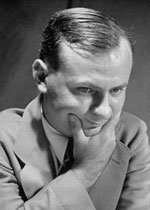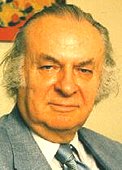Fine Dr. Reuben (11.10.1914 – 26.03.1993)
 U.S. Grandmaster (1950), author and psychologist. Fine, like Mikhail Botvinnik and Samuel Reshevsky, was one of the greatest living masters.
U.S. Grandmaster (1950), author and psychologist. Fine, like Mikhail Botvinnik and Samuel Reshevsky, was one of the greatest living masters.
Fine learned chess at the age of ten and developed his strength as a Marshall Chess Club junior. At the age of seventeen he won the club championship; a title he won several times. Fine achieved national recognition by his successes in the Western Chess Association and American Chess Federation Tournaments of 1932 to 1935 and by winning matches with Herman Steiner, Arthur Dake and Israel Albert Horowitz. He was a mainstay of the U.S. team at Warsaw 1935 and Stockholm 1937. Fine’s first important international victory was at Hastings 1935-1936 when he beat Salo Flohr and won first prize. He followed up with winning first prizes at Zandvoort 1936, Amsterdam 1936 (tied with Alexander Alekhine), Leningrad 1937, Moscow 1937, Margate 1937 (tied with Paul Keres) and Ostende 1937 (tied with Keres and Henri Grob). In the three great pre-War tournaments, he tied for third with Samuel Reshevsky and Max Euwe at Nottingham 1936, placed second to Keres at Semmering 1937 and tied with Keres for first prize in the AVRO Tourney 1938.
Fine was one of the world’s greatest lightning chess players; he won the U.S. Rapid Championship 1945. He was also a highly successful writer on the game. As a civilian employee of the Navy Department during the war and an accomplished linguist, he began studying mathematics then psychology and eventually got a Psychology PhD in 1948 from the University of Southern California. He took part in the 1945 and 1946 radio match between the USSR and the USA. In 1945 he finished second at Hollywood 1948 then refused to play in the World Championship in Moscow- The Hague because of professional commitments. Fine also won the New York tournament 1948/49. His last appearance was at New York 1951 where he took fourth place.
Fine is a chess player with a keen positional style and high technique of the game. Euwe’s opinion, in Meet the Masters (1940), was that Fine liked sharp positions, was an excellent lightning player, was gifted in solving technical problems and liked to confront his opponents with tricky problems from the very first move. Euwe described Fine’s play as having crystal clear logic and thought; his main witness was a none too cool temperament.
Fine wrote several books devoted to the various chess problems: “Dr. Lasker’s Chess Career 1889-1914” (1935) (with Reinfeld), “The World’s Great Chess Games” (1952), “The Psychology of Chess Players” (1973), “Fischer’s Conquest of the World Championship” (1973). His sixth edition of “Modern Chess Openings” 1939 was outstanding and his ‘‘Basic Chess Endings” (1941) became a masterpiece. Reuben Fine died in 1993, he was 79 years old.



